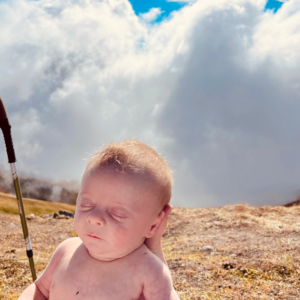 Have you ever caught yourself exclaiming that life would be so much better if people would just see things the way you do? I caught myself saying a similar rendition of this statement to my sister the other week. The reality is most of us believe we understand things about life that others don’t. What we fail to notice is that none of us know more than someone else. Instead, we are all ignorant and biased.
Have you ever caught yourself exclaiming that life would be so much better if people would just see things the way you do? I caught myself saying a similar rendition of this statement to my sister the other week. The reality is most of us believe we understand things about life that others don’t. What we fail to notice is that none of us know more than someone else. Instead, we are all ignorant and biased.
Ignorance and biases are apart of our human nature. They are also responsible for bringing us further away from happiness. They can create a sense of disconnect and seniority. We are also more likely to judge others, feel unfulfilled, and take life for granted when we view the world from limited and assumption-filled perspectives.
The practice of Yoga is not only about feel-good stretches and relaxing savasanas. Many aspects of yoga are uncomfortable. These ‘uncomfortable’ teachings offer us the opportunity to facilitate awareness of our limited ideas and beliefs. We can step toward living a more joyful life and away from suffering, by understanding how ignorance and one-sided perspectives appear in our own life. And yoga can help.
Avidya & The Kleshas
Misperception, identity, attachment, avoidance, and fear cause pain. (Yoga Sutra, 2:3)
Misperception is the root cause of all the obstacles that cause pain (Yoga Sutra, 2:4)
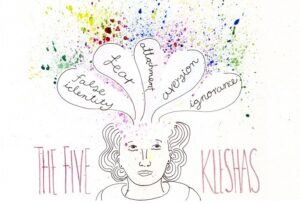
The term for ignorance in yogic philosophy is “avidya.” Avidya is our lack of awareness and disconnects us from knowing things the way they truly are. Ignorance arises when we believe our thoughts without question. Avidya is also at play when we draw false conclusions about ourselves, others, and the world.
Yogic philosophy states that ignorance is the root cause of all suffering. It is the first of four kleshas or mental afflictions described in The Yoga Sutras of Patanjali. The kleshas are disturbances of the mind that encompass all our fears, pet-peeves, addictions, habits, and misconceptions. The kleshas also include our self-limitations, obstacles, and roadblocks that prevent us from experiencing life to its fullest. They have the power to drive our behavior, causing us to develop unconscious patterns and ways of thinking that affect every aspect of our life.
Ancient yogis believed all forms of suffering could somehow fit into one of these five categories. Patanjali introduces the five kleshas in the Yoga Sutras. He states the five kleshas are:
- Ignorance/Misperception (Avidya)
- Identity
- Attachment
- Avoidance
- Fear
 These mental afflictions bring us further away from happiness. They also limit us in some way. If we know what is holding us back, then we can figure out a way to overcome these obstacles and keep moving forward.
These mental afflictions bring us further away from happiness. They also limit us in some way. If we know what is holding us back, then we can figure out a way to overcome these obstacles and keep moving forward.
What Is Ignorance?
 Ignorance is defined as “a lack of knowledge or information.” Ignorance may result in a misconception of reality due to inadequate knowledge. Avidya, or ignorance, may prevent us from accessing the part of us that contains pure joy and contentment, despite what is happening in the external world. Examples of Avidya include moments when we judge others, put ourselves down, or think the world is unfair. Another form of ignorance is believing other people or circumstances are responsible for our happiness. All of this causes us to feel disconnected from ourselves and those around us.,
Ignorance is defined as “a lack of knowledge or information.” Ignorance may result in a misconception of reality due to inadequate knowledge. Avidya, or ignorance, may prevent us from accessing the part of us that contains pure joy and contentment, despite what is happening in the external world. Examples of Avidya include moments when we judge others, put ourselves down, or think the world is unfair. Another form of ignorance is believing other people or circumstances are responsible for our happiness. All of this causes us to feel disconnected from ourselves and those around us.,
Forms Of Ignorance
Confusing impermanence and permanence, pain and pleasure, truth and untruth, as well as our ego from our potential, forms misperception. (Yoga Sutra, 2:5)
In the Yoga Sutras, Patanjali describes four specific ways in which we are all ignorant.
1. We mistake the impermanent for the permanent.
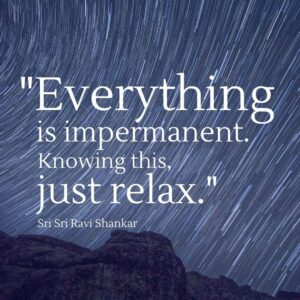 The first form of ignorance is the belief that the way things are now is how they will always be. However, nothing is permanent. As cliche as it may sound, we should appreciate the good times and remember that the bad times don’t last forever.
The first form of ignorance is the belief that the way things are now is how they will always be. However, nothing is permanent. As cliche as it may sound, we should appreciate the good times and remember that the bad times don’t last forever.
Lately, I’ve used the phrase, “I better do it while I can.” I better sleep in, exercise, clean my closet out, write, complete my online training, and enjoy going to work while I can. Sometimes, these things can feel daunting. Then I remind myself that I will not be able to do them one day because my life won’t last forever. Death is a certainty in each life. I don’t mean this in a fatalistic way. But death is a good reminder that nothing is permanent, including our life, so we better be grateful for each moment while we can.
2. We mistake delusion for the truth.
 This mistaking delusion for truth is the second form of ignorance that may cause us to see or believe things not as they really are. One hundred years ago, people believed drugs like cocaine and heroin could be used for medicinal purposes. Heroin was an ingredient in cough syrup. Sigmund Freud, a widely respected psychologist, and neurologist claimed cocaine helped him with “depression and against indigestion and with the most brilliant of success.”
This mistaking delusion for truth is the second form of ignorance that may cause us to see or believe things not as they really are. One hundred years ago, people believed drugs like cocaine and heroin could be used for medicinal purposes. Heroin was an ingredient in cough syrup. Sigmund Freud, a widely respected psychologist, and neurologist claimed cocaine helped him with “depression and against indigestion and with the most brilliant of success.”
In a 1903 Boston Globe story titled “Colors That Will Drive the Brain to Madness,” claimed the color purple was “the most dangerous color there is.” The author went on to say, “If purple walls and a red-tinted window surrounded you for a month with no color but purple around you, by the end of red-tinted you would be a madman.”
We, and all of society, continue to be wrong about the world every day. The goal is not to find the absolute “Truth” or always be 100% right. Instead, I like to discover where I may have been a little wrong today, so I can be a little less wrong tomorrow. Then I can wear purple shirts with ease and steer clear of doing heroin and cocaine for medicinal purposes.
3) We confuse pleasure and pain.
 The third form of ignorance is when we risk indulging in short-term pleasure in exchange for long-term pain. Often, this confusion presents itself in the form of addiction. Addiction is very prevalent in our society. The spectrum of addiction includes more than drugs and alcohol. It also incorporates gambling, shopping, making money, working, food, sex, and technology. Addiction can also show up in the form of co-dependency, negative thinking, self-doubt, and procrastination. Our current belief system, shaped by our experiences and society, can also be a lethal addiction.
The third form of ignorance is when we risk indulging in short-term pleasure in exchange for long-term pain. Often, this confusion presents itself in the form of addiction. Addiction is very prevalent in our society. The spectrum of addiction includes more than drugs and alcohol. It also incorporates gambling, shopping, making money, working, food, sex, and technology. Addiction can also show up in the form of co-dependency, negative thinking, self-doubt, and procrastination. Our current belief system, shaped by our experiences and society, can also be a lethal addiction.
I have used substances as a way to experience short-term gratification. I have also believed many thoughts about myself and others that serve no constructive purpose. I have and still do engage in these behaviors at times because change can be challenging. Clinical research has found that the early stages of changing a behavior or habit often fail. The ‘old way’ is way more comfortable. No matter how significant, the benefits of making a behavioral changes do not seem to outweigh the desire to avoid the pain of the change.
We are all susceptible to being addicted to feelings, beliefs, and behaviors we have grown used to. Thinking negatively about myself or others seems like less effort than putting continuous energy into changing habitual thought patterns. It appears to be much easier to reach for a drink to feel better temporarily than to process uncomfortable emotions. But the actual reality is, these forms of addiction do not deliver the long-term results that we may hope to achieve- which is the intention to live a more joyful, healthier, and fuller life.
4) We confuse our true selves.
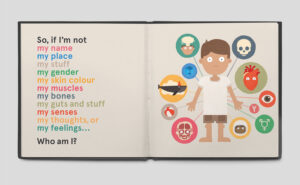 The fourth kind of ignorance is when we let other roles, ideas, and labels define who we are without question it. What if there were more to who we are than our profession or outward appearance? There is a saying in the yoga tradition, Sat- Chit- Ananda, which means we are pure truth, pure knowledge, and pure bliss. This permanent part of us tends to become hidden when we layer it with all our ideas of who we think we are. (More about this in next week’s blog post).
The fourth kind of ignorance is when we let other roles, ideas, and labels define who we are without question it. What if there were more to who we are than our profession or outward appearance? There is a saying in the yoga tradition, Sat- Chit- Ananda, which means we are pure truth, pure knowledge, and pure bliss. This permanent part of us tends to become hidden when we layer it with all our ideas of who we think we are. (More about this in next week’s blog post).
Ignorance Meets Bias
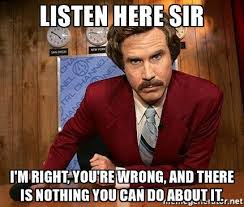 We, as a species, are also prone to biases. Bias is another form of ignorance. One-sided thinking is the opposite of remaining neutral. We naturally look for evidence to validate our beliefs and to disprove the other side. We adapt information in favor of our beliefs, resulting in “I am right” and “They are wrong” thinking. But what if we are all wrong?
We, as a species, are also prone to biases. Bias is another form of ignorance. One-sided thinking is the opposite of remaining neutral. We naturally look for evidence to validate our beliefs and to disprove the other side. We adapt information in favor of our beliefs, resulting in “I am right” and “They are wrong” thinking. But what if we are all wrong?
Bias also plays a role in how we see the world. For example, if you think everyone in the world is inconsiderate and unkind, you will start to encounter these types of interactions. Your brain seeks out evidence to support whatever bias you choose. It’s like how Google will learn what you like or dislike by tracking your ‘search queries’. It would seem better to train our own information processing brains to seek out helpful, considerate, and kind people rather than searching for inconsiderate people.
As a species, we also tend to notice what is wrong with things rather than what is good. This negativity bias causes us to latch on to the one bad thing rather than take in the hundreds of good things. It also makes it difficult for us to discern a problem from a loss of perspective. For example, is it really the absolute END OF THE WORLD that Netflix no longer has episodes of “The Office”? Or, is it just a loss in perspective? I suppose I still have access to other shows on Netflix while someone else doesn’t even have access to clean drinking water.
Another way we are biased is we blame others for their faults yet justify our reasons for doing the same thing. For example, I can recall a time (or more) I gave someone the middle finger for speeding through a red light. This person clearly was a terrible person for putting others in danger by driving so carelessly. Yet, I can also recall a time (or two) I have also sped through a turning red light. But obviously, I only did this because it had JUST turned red, and I was already half-way through the intersection anyway…
Questions To Combat Ignorance & Biases?
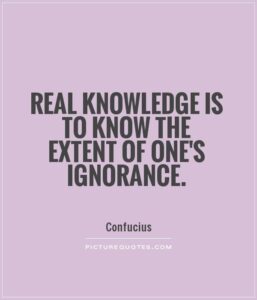 People can look at the same thing and choose to see what they want to see. But what if we are all wrong? What if we walk around viewing the world through different lenses that skew our perception of reality? What if there is a way to take these glasses off and see things how they are?
People can look at the same thing and choose to see what they want to see. But what if we are all wrong? What if we walk around viewing the world through different lenses that skew our perception of reality? What if there is a way to take these glasses off and see things how they are?
Unfortunately, we cannot just take these glasses off without effort. We have to combat ignorance by keeping an open mind rather than choose to view the world from a one-sided perspective. We also must increase our awareness of our limited beliefs, ideas, identity, actions, and perceptions. Then, we have to question them daily (i.e., “Was I also driving carelessly by speeding through a red light?”).
In next week’s blog post, we will further explore the second klesha- identity. For now, I challenge you to ponder how avidya (ignorance) & biases have shown up in your life by addressing the below contemplation points. Have fun!
Contemplation Points
- Question Impermanence and Permanence
What in your life brings you the most joy? What causes you pain or feelings of unrest? Identify those things that are permanent vs. impermanent.
I recently realized all of life’s circumstances are impermanent. I have a plethora of thoughts that enter in and out of my mind during the day. These are all impermanent. But I can also choose to have permanent control over which thoughts I allow to drive my feelings, actions, and results. I also know there is a permanent part of me that can feel at rest despite what is going on with other people or the world.
- Question Your Delusions
What things did you use to think about yourself, others or the world that you no longer think are true? What could you still be thinking now that is untrue? How can you bring a little more truth to your current belief?
Recently, I believed maintaining a blog was unsustainable if I wanted to pursue other things. Rather than quit, I questioned this belief and made adjustments to make it sustainable.
- Question what brings you long-term pleasure
What activities do you engage in that generate desired results in your life? For example, I know that waking up around 5 am to do my breathing practice does not feel good in the moment. I resist getting out of bed every morning. But I know I will have a much better day if I tend to my morning routine rather than brush it off for a little extra sleep.
- Question who you are
Who are you when you strip away your likes, dislikes, profession, achievements, failures, familial roles, hobbies, etc.? The answer may be hard to put into words. I have experienced this title-less part of myself when in silence or immersed in something I love, like petting my dogs.
- Question your biases
Have you gotten upset with someone about something that you have also done? What do you think their intention was? Could it have been similar to yours? Can you notice five good things for every negative thing? How can you learn more about an opposing view to increase your understanding of why someone may believe something different than you?





